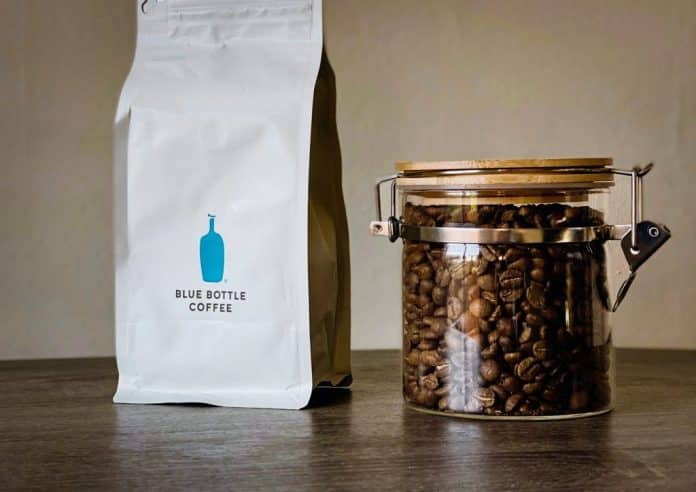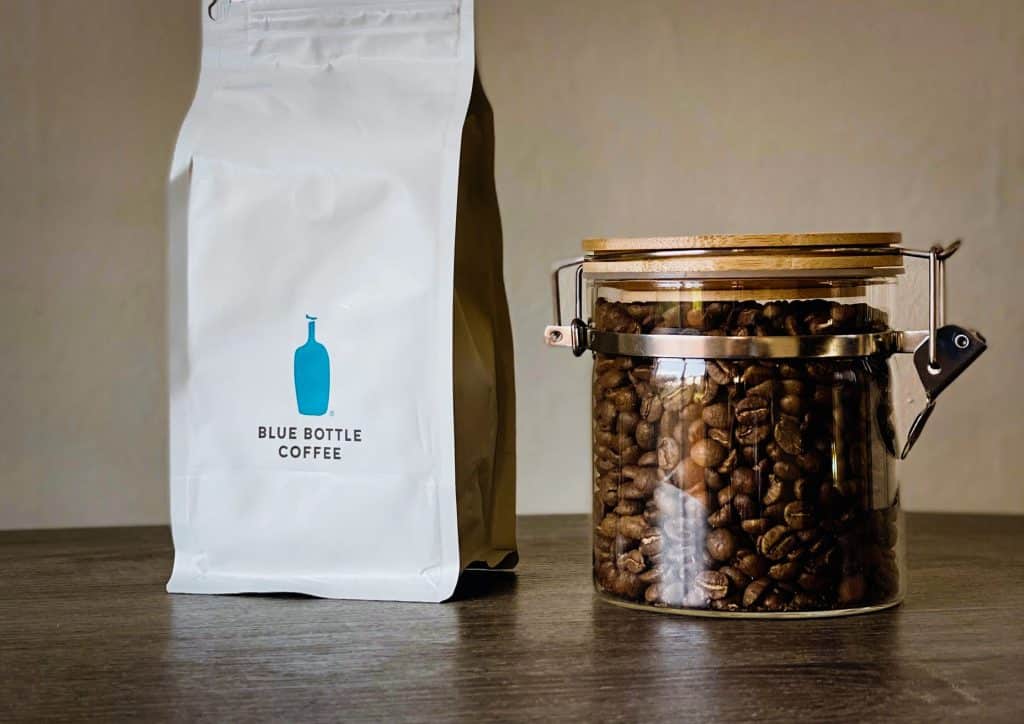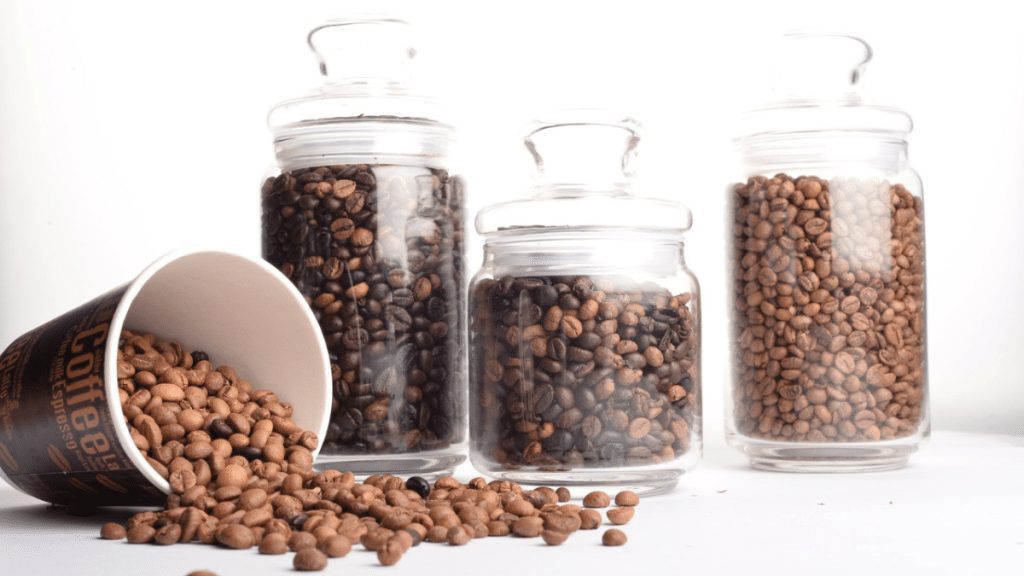In this article, you will discover practical methods to store your coffee beans and ensure their freshness for a more extended period.
Whether you are a coffee enthusiast or simply enjoy a good cup of joe, understanding the importance of proper storage techniques is vital to preserving the rich flavor and aroma of your coffee beans.
By following these tips, you can savor every sip, experiencing the essence of freshly roasted coffee beans.
So, let’s explore the secrets to keeping your coffee beans at their best, shall we?
Choosing the Right Container
When storing coffee beans, choosing the correct container ensures their freshness and flavor.
There are a few factors to consider when selecting a container: the material, size and shape, and airtightness.
Material
The material of the container plays a significant role in preserving the quality of your coffee beans. It is best to opt for containers made of materials that do not interact with the coffee beans or alter their flavor.
Glass, ceramic, or stainless steel containers are excellent choices as they are non-reactive and do not affect the taste of the coffee.
Size and Shape
The size and shape of the container also matter when it comes to preserving the freshness of your coffee beans. Choosing a container that can hold your entire supply of coffee beans without leaving much space is advisable.
This helps minimize the beans’ exposure to air, which can lead to staleness. Additionally, a container with a wide opening makes it easier to access the beans without causing damage.
Airtightness
Perhaps the most crucial aspect of a storage container is its airtightness. Oxygen is one of the primary enemies of coffee beans as it accelerates the staling process.
Therefore, investing in a container that can seal tightly is vital, preventing air entry. Look for containers with reliable airtight lids or seals that create a barrier against oxygen, keeping your coffee beans fresh for longer.
Avoiding Exposure to Light
Exposure to light can have a detrimental impact on the quality of your coffee beans. Light, especially sunlight, can lead to the degradation of coffee oils and cause flavor loss.
To ensure your coffee beans stay fresh and flavorful, it is crucial to shield them from light.
Impact of Light on Coffee Beans
Coffee beans, when exposed to light, undergo a process called oxidation. This process causes the coffee’s oils and compounds to break down, compromising the aroma and taste.
The longer the exposure to light, the more pronounced the adverse effects become, resulting in a stale and lackluster cup of coffee.
Using Dark Containers
One effective way to prevent the damaging effects of light is by storing your coffee beans in dark containers. Dark-colored glass or opaque containers can shield the beans from natural and artificial light sources.
By blocking out light, you can preserve your coffee beans’ delicate flavors and aromas more effectively.
Storing in a Dark Place
In addition to using dark containers, storing your coffee beans in a dark place is essential. Find an excellent, dry spot away from direct sunlight or artificial light sources. A pantry or cupboard works well for storing your coffee beans, ensuring they are protected from light exposure that can affect their freshness.
Temperature Control
Controlling the storage temperature of your coffee beans is another crucial factor in maintaining freshness and flavor. Different temperatures can influence the chemical reactions within the beans, affecting their taste and aroma.
Optimal Storage Temperature
The recommended storage temperature for coffee beans is between 50°F (10°C) and 70°F (21°C). These temperatures promote a stable environment for the beans, preventing the breakdown of essential oils and preserving their flavors. Avoid storing your coffee beans in areas that are too hot or humid, as this can accelerate the deterioration process.
Avoiding Extreme Temperature Changes
Extreme temperature changes can have a detrimental impact on your coffee beans. When exposed to drastic heat or cold, the expansion and contraction of the beans can adversely affect their flavor and aroma. It is best to store your coffee beans in a location with a consistent temperature to avoid fluctuations that can compromise their quality.
Maintaining Proper Humidity
The humidity surrounding your coffee beans can significantly impact their freshness and taste. Proper humidity control is necessary to prevent moisture from damaging the beans and causing mold or mildew growth.
Effects of Humidity on Coffee Beans
High humidity levels can lead to moisture absorption by the coffee beans, causing them to become damp and lose their flavor. On the other hand, low humidity can cause the beans to dry out, leading to a loss of aroma and freshness.
Ideal Humidity Levels
The ideal humidity range for storing coffee beans is between 55% and 70%. This range allows the beans to retain optimal moisture content without becoming too damp or dry. Consider using a hygrometer to monitor the humidity levels in the storage area and make adjustments as necessary.
Use of Moisture Absorbers
You can place moisture absorbers, such as silica gel packets, in your coffee storage container to maintain the proper humidity level.
These packets help to absorb excess moisture and prevent the beans from becoming damp. Be sure to replace the moisture absorbers regularly to ensure they continue to function effectively.
Avoiding Oxygen Exposure
Oxygen exposure is a significant contributor to the degradation of coffee beans. When the beans come into contact with oxygen, they undergo oxidation, resulting in a loss of freshness and flavor.
To preserve the quality of your coffee beans, minimizing their exposure to oxygen is essential.
Negative Effects of Oxygen on Coffee Beans
Oxygen causes the coffee’s oils and volatile compounds to deteriorate rapidly, resulting in a dull and stale taste.
The longer the beans are exposed to oxygen, the more pronounced these negative effects become. Minimizing the amount of oxygen in contact with the beans is crucial for preserving their flavor and aroma.
Using Vacuum-Sealed Containers
Vacuum-sealed containers are an excellent option for storing coffee beans, as they create a near-oxygen-free environment. By removing the air from the container, you can significantly extend the shelf life of your beans and maintain their freshness. Vacuum-sealed containers are readily available and can be a worthwhile investment for coffee aficionados.
Minimizing Air Contact
In addition to using vacuum-sealed containers, minimizing air contact when accessing your coffee beans is essential. Open the container briefly and reseal it promptly to prevent prolonged exposure to oxygen. Opt for smaller containers that can be filled with enough beans for a week or two, reducing the frequency of air contact and maintaining freshness.
Keeping Coffee Away from Strong Odors
Coffee beans are highly porous and can absorb surrounding odors and flavors. Exposure to solid odors can result in off-flavors and diminish the quality of your coffee. It is crucial to store your coffee beans away from strong-smelling items to ensure their taste remains uncompromised.
Why Strong Odors Are Detrimental
Strong odors can infiltrate the porous surface of coffee beans, tainting their natural flavors. The aromas of nearby spices, herbs, or other spicy foods can overpower the delicate nuances of your coffee. To fully enjoy the complex flavors of your brew, it is essential to keep your coffee beans away from these aromatic influences.
Distance from Fragrant Items
Ideally, store your coffee beans away from strong-smelling items, such as spices, herbs, or cleaning agents. Maintaining some distance between your coffee and these odorous substances ensures that your coffee retains its original flavors and aromas.
Use of Neutralizing Agents
If your coffee beans have absorbed unwanted odors, you can use neutralizing agents to restore their natural flavors.
Placing an open container of baking soda or activated charcoal near your coffee beans can help absorb any lingering odors. Ensure the containers do not directly contact the coffee to avoid altering its taste.
Monitoring Roast Date
Regarding coffee freshness, the roast date plays a crucial role. To ensure you always have the freshest coffee experience, monitoring the roast date of your beans is essential.
Understanding the Importance of Roast Date
The roast date indicates how recently your coffee beans were roasted. Freshly roasted beans offer the best flavor and aroma as they retain more natural oils and volatile compounds.
As time passes, these compounds degrade, resulting in a less flavorful cup of coffee. By paying attention to the roast date, you can gauge the freshness of your beans and enjoy them at their peak.
Using Freshly Roasted Beans
When purchasing coffee beans, prioritize those with a recent roast date. Ideally, try to consume the beans within two to four weeks of the roast date for the best flavor. Fresher beans yield more vibrant and complex flavors, allowing you to savor the unique characteristics of each coffee variety.
Rotating Coffee Stock
Practice rotating your stock to ensure you always use the freshest coffee beans. Arrange your beans chronologically based on their roast dates, using the oldest ones first. This way, you can maintain a steady supply of fresh coffee while preventing beans from going stale.
Proper Grinding Techniques
They are grinding your coffee beans just before brewing is crucial for obtaining the best-tasting coffee. The grind size and consistency significantly affect the extraction process, and improper grinding techniques can lead to subpar results.
Effects of Grinding on Coffee Beans
When coffee beans are ground, their surface area increases, allowing for faster brewing extraction.
However, improper grinding techniques can result in an uneven particle size distribution, leading to under-extraction or over-extraction of flavors. Achieving the right grind size is vital for optimizing the taste and aroma of your coffee.
Grinding Just Before Brewing
To preserve the freshness and maximize the flavor potential of your coffee beans, it is recommended to grind them just before brewing. This way, you capture the volatile aromatic compounds at their peak, resulting in a more flavorful cup of coffee. Invest in a good quality burr grinder that allows you to adjust the grind size according to your brewing method.
Storage of Ground Coffee
If you prefer to grind a larger quantity of coffee beans at once, it is crucial to store the ground coffee properly.
Place the ground coffee in an airtight container and store it in a cool, dark place away from light, heat, and moisture. Ground coffee is more susceptible to flavor degradation, so it is best to use it within a week to ensure optimal taste.
Freezing Coffee Beans
Freezing coffee beans can be valuable to extend their shelf life and maintain their flavors. However, specific guidelines are needed to ensure that freezing is done correctly.
Potential Benefits of Freezing
Freezing coffee beans can help preserve their freshness and flavors for an extended period. By freezing the beans, you can slow down the degradation process caused by oxygen and the staling effects of time.
This can be particularly useful if you purchase larger coffee beans or want to keep a backup supply.
Preparation Before Freezing
To prepare your coffee beans for freezing, divide them into small, airtight containers or freezer-safe bags. It is essential to remove as much air as possible to minimize exposure to oxygen.
Label and date the containers to keep track of their freezing time. Before freezing, ensure that the beans have cooled completely to prevent condensation from forming.
Thawing and Using Frozen Beans
When ready to use the frozen coffee beans, remove only the portion you need and allow them to thaw at room temperature. Avoid repeated freezing and thawing, as this can degrade the quality of the beans. It is recommended to use the frozen coffee beans within three to four weeks to maintain the best flavor and aroma.
Regularly Cleaning Storage Containers
Keeping your storage containers clean is essential to prevent the buildup of coffee oils and maintain the freshness of your beans. Dirty containers can contribute to off-flavors and compromise the quality of your coffee.
Risks of Dirty Containers
Coffee beans contain oils that can leave a residue in your storage containers over time. This residue can turn rancid and become a breeding ground for bacteria, leading to stale and off-flavored coffee. Regular container cleaning ensures no unwanted flavors or odors seep into your beans.
Proper Cleaning Methods
To clean your storage containers, start by emptying any remaining coffee beans. Wash the container with warm, soapy water, using a gentle brush to remove any residue.
Rinse thoroughly and let the container air dry completely before refilling it with fresh beans. Avoid harsh chemicals or abrasive materials that may damage the container or leave residue behind.
Preventing Coffee Oils Residue
To minimize the buildup of coffee oils in your storage container, make it a habit to clean the container after each use.
Additionally, consider storing your coffee beans in a separate, airtight bag or container before placing them in the storage container. This extra layer can prevent direct contact between the beans and the container, reducing the chance of residue buildup.
By following these guidelines on storing coffee beans, you can ensure that your daily cup of joe is always fresh and flavorful.
The correct container, proper temperature and humidity control, optimal grinding techniques, and careful handling of the beans can all contribute to preserving the quality of your coffee.
With these practices in place, you can savor the rich and nuanced flavors of your favorite coffee beans every time you brew a cup.










































